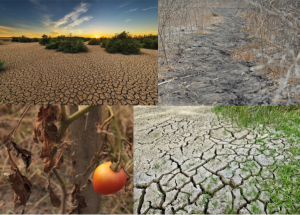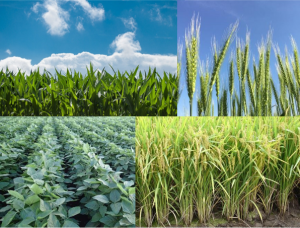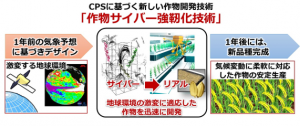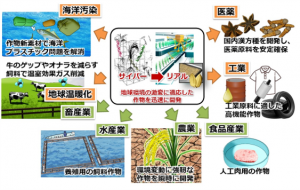Food crisis
 In 2050, the world’s population is expected to reach 9.7 billion, requiring 1.7 times more food than was produced in 2010.
In 2050, the world’s population is expected to reach 9.7 billion, requiring 1.7 times more food than was produced in 2010.
On the other hand, because of global warming, extreme weather conditions are becoming more frequent around the world.
As global warming progresses further, the growth of production of major grains such as rice, wheat, and soybean will slow down, making it difficult to meet our food needs in 2050.
The Future We Should Aim For
 It is said that the year 2030 is a turning point that will determine whether a food crisis will occur.
It is said that the year 2030 is a turning point that will determine whether a food crisis will occur.
This project will contribute to the realization of a society with a sustainable food supply so that we can maintain a rich food culture in 2030 and beyond.
Plants are the only higher organisms that can produce organic matter from inorganic matter.
Society is built on the utilization of various substances produced by plants.
They are also the basis of our food supply.
In this project, we aim to realize zero food risk by maximizing the potential of plants that support our society.
Paradigm shift in crop development technology
 In this project, we will establish cyber crop design technology using the Cyber-Physical System (CPS), which is a sophisticated fusion of cyber space (virtual space) and physical space (real space).
In this project, we will establish cyber crop design technology using the Cyber-Physical System (CPS), which is a sophisticated fusion of cyber space (virtual space) and physical space (real space).
This will enable us to achieve a paradigm shift from conventional technology so that we can design crops in cyberspace and rapidly produce them to meet our objectives.
The future opened up by the “power of plants”
 The cyber crop design technology that we are aiming for is not only for environmental stress tolerance, but also for the rapid development of crops that can meet all kinds of needs.
The cyber crop design technology that we are aiming for is not only for environmental stress tolerance, but also for the rapid development of crops that can meet all kinds of needs.
By fully utilizing the power of plants, we can create various materials and substances starting from inorganic materials, which can be used in many fields that contribute to our society.
In addition to agriculture, animal husbandry, fisheries, forestry, and the food industry, the cyber crop design technology can also contribute to industry, medicine, and alleviate environmental issues such as global warming and ocean pollution.
